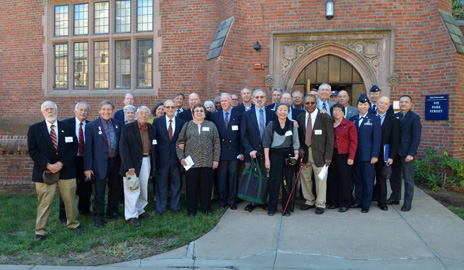
Half a century after they helped Yale refine a new method of language study, 28 retired Air Force personnel who learned Chinese at the university during the 1950s and 1960s returned to campus on Sept. 25, many for the first time since their student days.
The men were once students at Yale’s Institute of Far Eastern Languages (IFEL), which had its origins in the Chinese Language School started on campus during World War II to teach Putonghua to U.S. Army officers. The Army chose Yale because of its groundbreaking work in making East Asian languages easier to learn by transliterating them using the Western alphabet, a system known today as Yale Romanization.
The Chinese Language School grew into the Institute of Far Eastern Languages in 1947, and its faculty began to develop a radical new approach to learning a spoken language that relied on intensive interaction between students, teachers, and recorded speech. This innovative new system came to be known as the Yale Method, and IFEL was among the very first programs anywhere to introduce the now-familiar “language laboratory” concept.
By the early 1950s, when the Korean War broke out, IFEL’s primary mission had become the training of U.S. Air Force personnel in Chinese and Korean. Its classes were conducted in a house on Yale’s “Fraternity Row” at 215 Park St., which had been purchased by Yale in the 1940s from a bankrupt fraternity. Many of the IFEL “alumni” who returned to campus this September related fond memories of their years in that building, where their intensive language study helped faculty refine and develop the Yale Method.
IFEL ceased to exist in 1965, when its classes were folded into Yale’s broader language programs. Its role in the history of language study might have been forgotten — except for a seemingly unrelated historical footnote. When President John F. Kennedy came to Yale in June 1962 to receive an honorary degree, his Air Force honor guard consisted of volunteers from that year’s class of IFEL students. These uniformed Air Force personnel appear in one of the most famous photos ever taken at Yale, in which they can be seen saluting Kennedy as he walks across the Old Campus. The photo appeared in newspapers across the United States the next day.
Each of the honor guard members received a print of the photograph, and nearly 50 years later one of these prints found its way into a Web album posted by Kevin Riddle, now retired and living in Virginia, who had been one of those young Air Force sergeants in 1962. In December 2011 it was discovered online by Yale alumnus Ravi Goel ’93, a doctor in Philadelphia who collects rare photographs and had been researching the ones taken during Kennedy’s 1962 visit to Yale. He wrote to the owner of the Web album, and when Riddle mentioned that the following year would be the 50th anniversary of his IFEL class’s graduation, Goel put him in touch with the Association of Yale Alumni (AYA).
The result was a day-long reunion of 22 Air Force veterans of the IFEL program in September of 2012. During the event, co-sponsored by the AYA and the Yale Veterans Association, the group donated a plaque to Yale commemorating the Institute of Far Eastern Languages and the Yale Method of instruction. The plaque, designed by university printer John Gambell, was installed at 215 Park St. this past summer, and the AYA invited all IFEL alumni to return to campus on Sept. 25 for its dedication.
“After so many IFEL alumni came back to campus last year, we were expecting a much smaller crowd for this year’s follow-up event just to dedicate the plaque,” said Henry Kwan ’06 M.A., the AYA’s liaison with the Yale Veterans Association. “Instead, nearly 30 showed up!”
The IFEL alumni from classes of the 1950s and 1960s attended Wednesday morning ceremonies conducted in the Great Hall of Rose Alumni House on York Street. They were welcomed by the AYA’s Robert Bonds ’71, who recapped the history of IFEL and why it was important to Yale; Tom Opladen ’66, co-chair of the Yale Veterans Association, who thanked the veterans for their service to the nation; and Colonel Scott Manning, commander of Yale’s Air Force ROTC detachment, who reminded them of their distinguished place in Yale’s history.
***************************************
Air Force Vets Who Helped Pioneer Chinese Language Study at Yale Return to Campus,





